Southern Culture On The Skids released a cicada-themed song for 2020: Cicada Rock 2020 (Brood IX). Enjoy!
Category: Brood IX
Magicicada septendecim cicada from Brood IX in Greenbrier County, WV. Photo by Tony Maro. Thanks Tony!
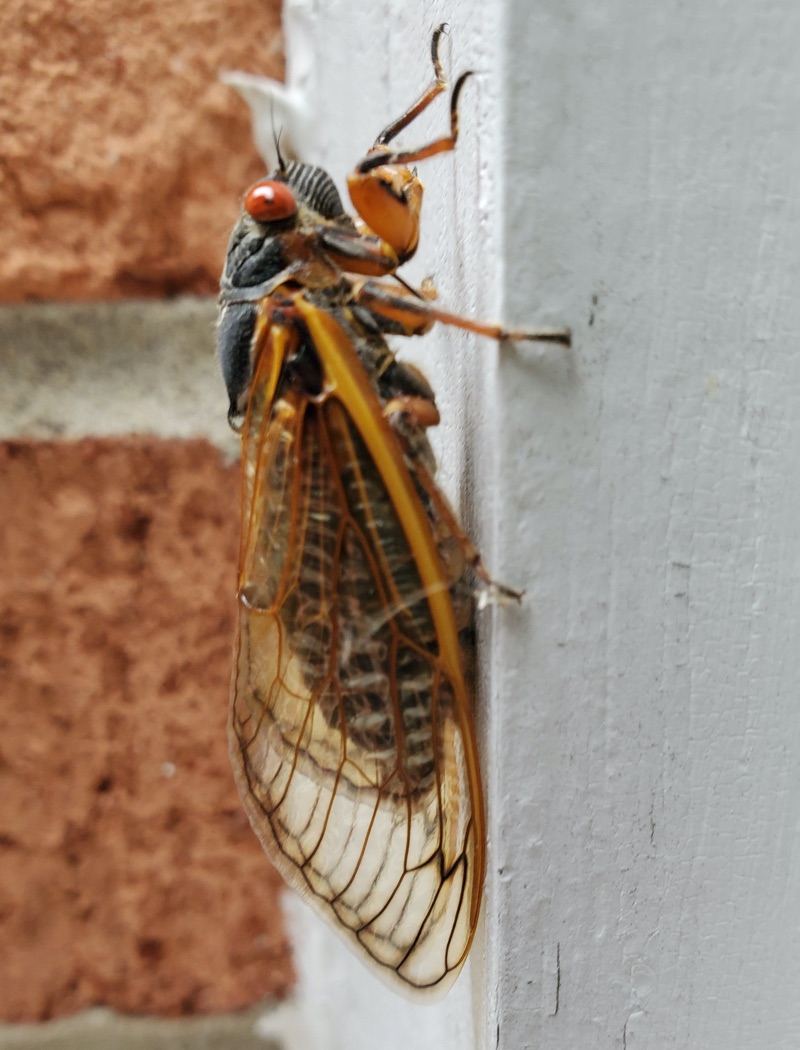
Periodical cicada Brood IX (9) emerged in the spring of 2020 in North Carolina, Virginia and West Virginia. The last time this brood emerged was in 2003. It will emerge again in 2037.
Researchers need your help! If you see a cicada, please report it using the Cicada Safari App , available for Android and Apple phones.
Brood IX is interesting to researchers because it’s located very close to 5 other broods. In a normal year, researchers would be able to drive the roads of the area and map the location of the brood so we can get data as to where the broods intersect, but because of the current situation in the U.S., most if not all researchers will be able to travel — so we need you to let us know where they’re at. Read more on Cicadas @ UCONN (formerly Magicicada.org).
What, when, where, and why:
What:
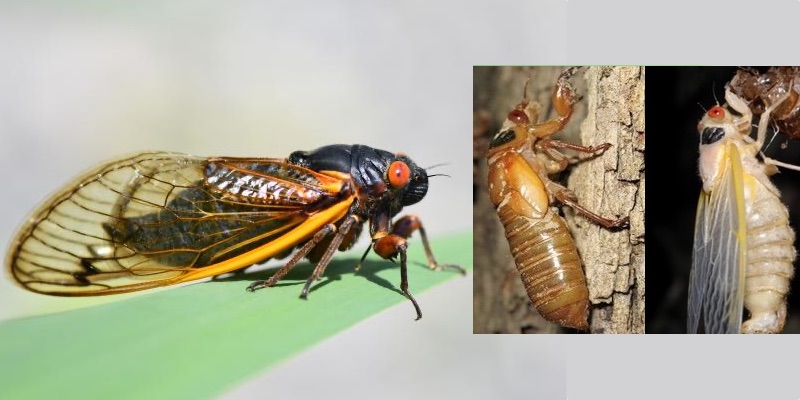
- Cicada insects with a 17-year life cycle.
- Some people call them “locusts” but they’re really cicadas.
- Which species: All three 17-year species, Magicicada septendecim, Magicicada cassini and Magicicada septendecula. How to tell the difference between the species.
- NOT the green ones that arrive annually.
When: Typically beginning in mid-May and ending in late June. These cicadas will begin to emerge approximately when the soil 8" beneath the ground reaches 64 degrees Fahrenheit (Heath, 1968). A nice, warm rain will often trigger an emergence.
Other tips: these cicadas will emerge after the trees have grown leaves, and, by my own observation, around the same time Iris flowers bloom.
Where:
- Virginia municipalities: Blacksburg, Bland, Callands, Christiansburg, Covington, Dry Pond, Ferrum, Martinsville, Roanoke, Salem, Vinton, and more.
- Virginia counties: Allegheny, Bland, Franklin, Henry, Montgomery, Patrick, Pittsylvania, Roanoke.
- North Carolina municipalities: Chestnut Hill, Ennice, Francisco, Hays, Kernersville, McGrady, Millers Creek, Mt Airy, North Wilkesboro, Purlear, Thurmond, Westfield, and more.
- North Carolina counties: Ashe, Alleghany, Forsyth, Stokes, Surry, Wilkes.
- West Virginia municipalities: Camp Creek, Elmhurst, Hinton, Jumping Branch, Spanishburg, and more.
- West Virginia counties: Fayette, Greenbrier, Mercer, Monroe, Pocahontas, Summers.
A quick tip using data from the Cicada Safari app team:
Cicadas in the north-west areas are Brood IX (red). Cicadas south & east of that area (purple) are Brood XIX emerging early.
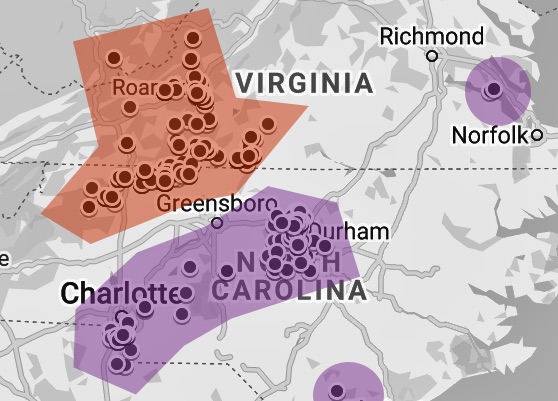
Maps, Apps, and Tips:
- Cicadas @ UCONN has the most up to date maps.
- The Cicada Safari App is available for Android and Apple devices. Use it to see where people are finding cicadas, and to report your own sightings.
- City data comes from May 2003 reports and June 2003 reports.
- Not sure? Ask someone in your community who lived there 17 years ago.
Why: Why do they stay underground for 17-years? The prevailing research suggests they’ve evolved a long, 17-year lifecycle to avoid predators that can sync up with their lifecycle & emergence. Why are there so many?! Research suggests that their huge numbers allow them to overwhelm predators, so enough of them will live on to breed and perpetuate the brood.
More facts and fun:
- Use the correct image when talking about these cicadas.
- Use the Periodical Cicada Emergence Checklist for the Maximum Magicicada Experience.
- All cicada questions that are frequently asked.
- A video to help you tell the difference between the species.
- The 17 Most Interesting Periodical cicada facts.
1907 Map from Marlatt, C.L.. 1907. The periodical cicada. Washington, D.C.: U.S. Dept. of Agriculture, Bureau of Entomology.
The larger dots are valid. Tiny dots, no. See a modern map, or the Live Map from the Cicada Safari app.
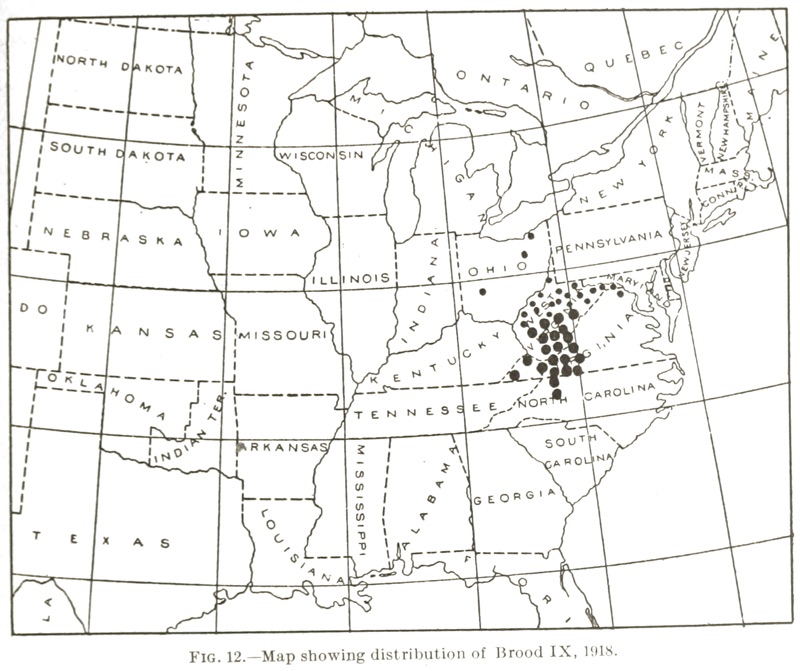
These are the 17 most interesting 17-year cicada facts (IMHO). All these facts apply to 13-year cicadas as well.
#1. Names for cicadas
People call these cicadas “locusts” but they are not true locusts — real locusts look like grasshoppers. The phrase “17-year cicada” indicates that they arrive every 17 years. The name “periodical cicadas” indicates that they arrive periodically and not each and every year. The scientific name for the Genus of these cicadas is Magicicada, and there are 3 types of 17 year Magicicadas: Magicicada septendecim, Magicicada cassini and Magicicada septendecula.
This is a true locust:
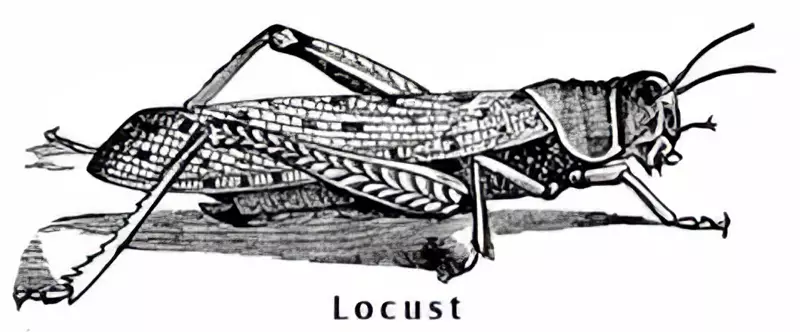
#2. There are 13-year cicadas too
There are 13-year cicadas too! There are four species of 13-year cicadas: Magicicada tredecim, Magicicada neotredecim, Magicicada tredecassini, and Magicicada tredecula. Broods XIX, XXII and XXIII feature these cicadas.
Here’s a video that will help you identify the various species.
#3. Many Eye Colors
Most 17-Year Cicadas have red eyes, but they can also have white, gray, blue , or multi-colored eyes.
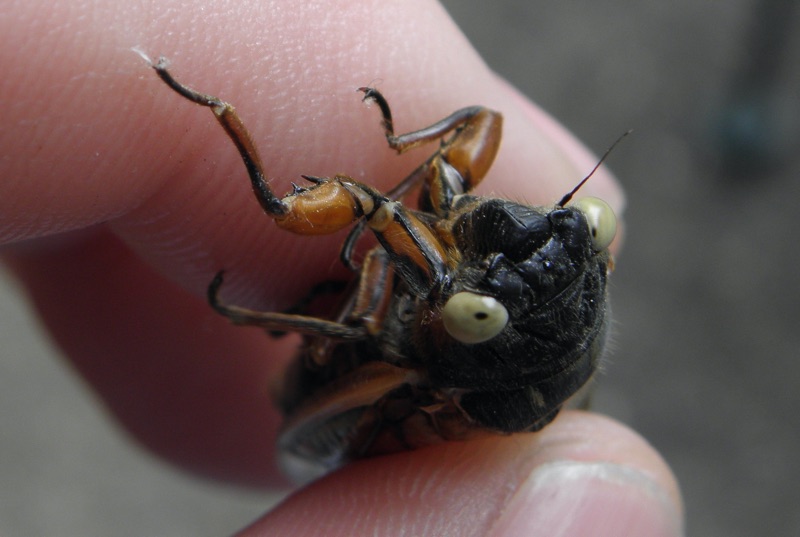
#4. Fungus
The Massospora cicadina fungus infects Magicicadas, destroying their abdomen and ability to reproduce. Often, their entire abdomen will fall off. The cicadas spread the fungus throughout their local colony via mating. The Massospora fungus is a cicada STD!
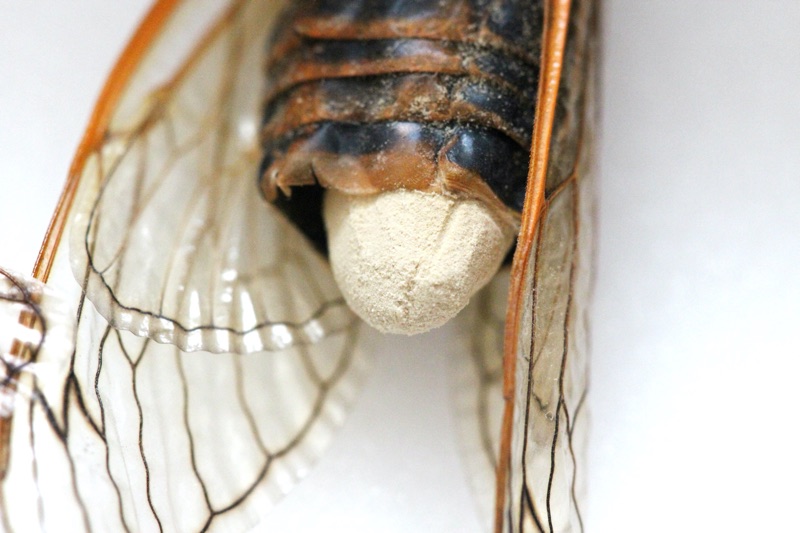
#5. They will land on you if you are using a power tool or lawn mower
Cicadas think the sounds made by power tools and lawn maintenance equipment are made by cicadas. They get confused and will land on the people using the equipment! Pro-tip: cut your lawn in the early morning or near dusk when the cicadas are less active.

#6. Cicadas have five eyes
Cicadas have two, obvious, large, compound eyes, and three ocelli. Ocelli are three jewel-like eyes situated between the two main, compound eyes of a cicada. We believe ocelli are used to detect light and darkness. Ocelli means little eyes in Latin.
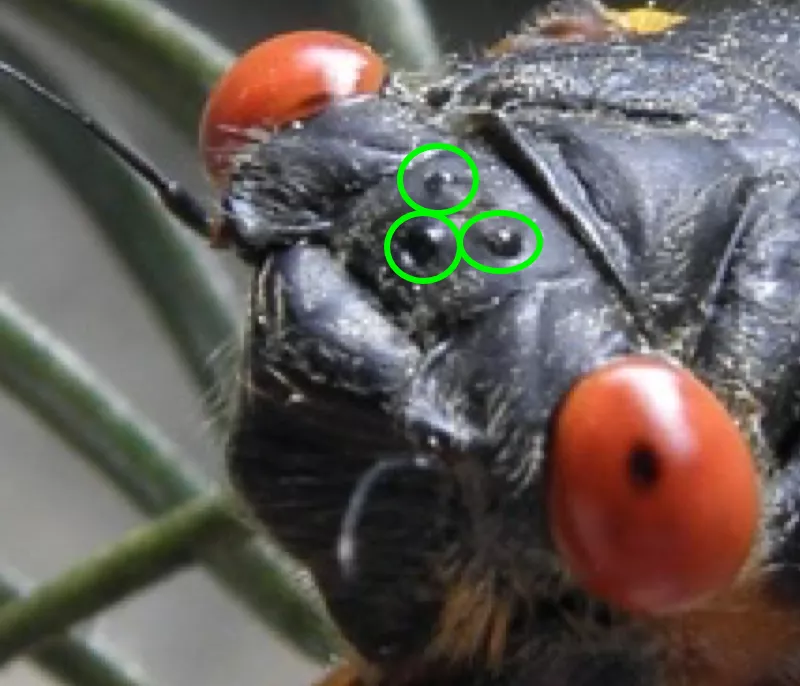
#7. People eat them
People eat them. You can barbecue it, boil it, broil it, bake it, sauté it. There, uh, cicada kabobs, cicada creole, cicada gumbo, panfried, deep fried, stir fried. There’s pineapple cicada, lemon cicada, coconut cicada, pepper cicada, cicada soup, cicada stew, cicada salad, cicada and potatoes, cicada burger, cicada pizza, cicada sandwich… that’s, that’s about it.

#8. Animals eat them
All wild animals and domestic pets will eat them. Dogs will gorge themselves until they choke. Squirrels will eat them like corn on the cob. Wild turkeys will grow fat and juicy on the cicada feast. Fish go crazy for them too — you can use them as bait, or use lures that mimic them.
#9. Cicadas “eat” tree fluids
Cicadas don’t eat solid foods like leaves or fruits. Instead they use their slender, straw-like mouth parts to drink tree fluids.
#10. Cicadas pee
Yes cicadas pee, so wear a hat when walking under trees if that sort of thing bothers you. Cicadas drink tree fluids and then expel the excess fluid they do now need. People call it “honeydew” or “cicada rain”.
#11. How cicadas make their sound
Only male cicadas make the loud sound they are famous for. Males have organs on their abdomen called tymbals. Muscles pop the tymbals in and out, which creates the sound we hear. Males make different calls for different reasons, and each species has a unique sound. Females can make sound too: they flick their wings to respond to males.
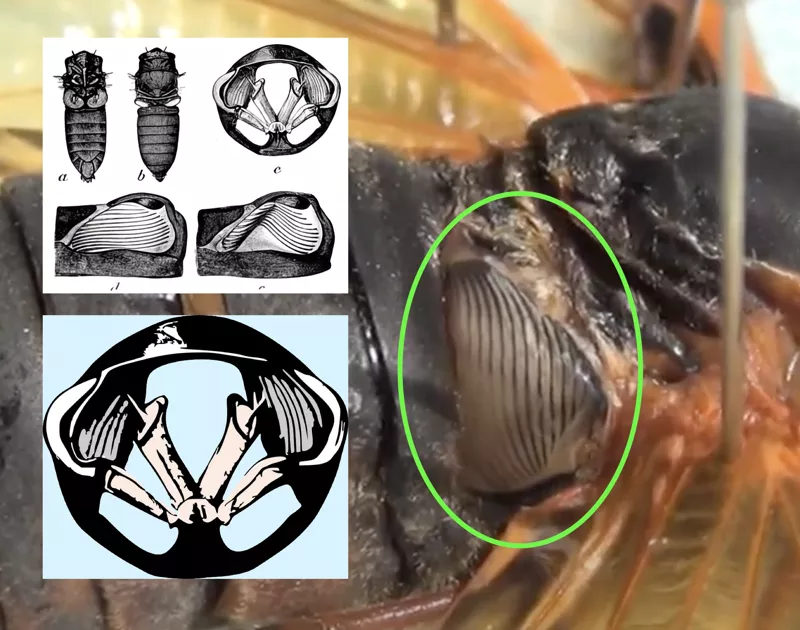
#12. There are billions of them
There are literally billions, if not trillions, of 17-year cicadas. Why? One theory suggests that a large number of cicadas overwhelms predators, so predators are never able to eat them all and cicadas, and many always survive to mate. This is a survival strategy called “predator satiation”.
#13. They damage wimpy trees
The biggest concern about 17-year cicadas is their potential to damage young trees. The truth is they will damage limbs on the wimpiest of trees, so if you have weak, pathetic, wimpy ornamental trees in your yard you should consider placing netting around the trees if the cicadas visit your yard. Also, you can try hosing them off with water, placing insect barrier tape around the trunk of the trees, or picking them off like grapes! Or, plant strong, beefy American trees — that’s what I would do. Cicadas actually benefit the health of trees by aerating the soil around the roots and trimming the weak or damaged limbs.
#14. Stragglers
Periodical cicadas that emerge in years before they are supposed to emerge are called stragglers.
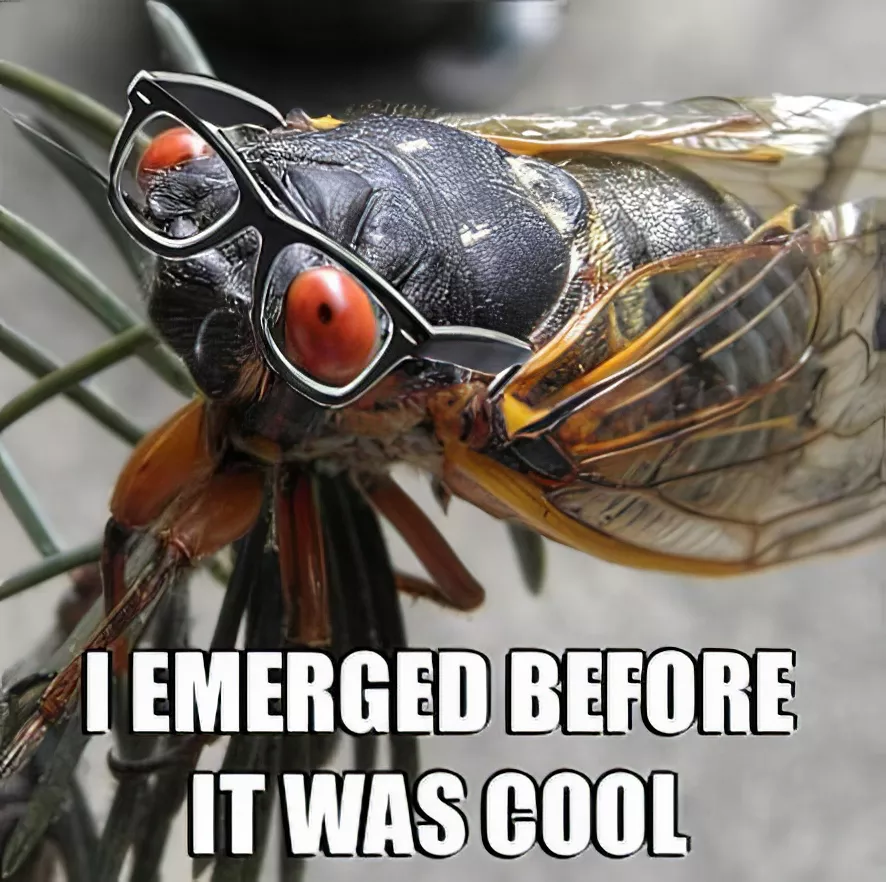
#15. 17 and 13 are prime numbers
Scientist speculate that one reason why these cicadas emerge in 17 or 13 year cycles is because those are prime numbers. The fact that 13 & 17 are relatively large* prime numbers makes it difficult for predators to synchronize with them. (*Relative to the average lifespan of an animal.) Annual cicadas (cicadas that arrive every year) often have wasps specialized to prey on them; periodical cicadas have no such wasp because no wasp could evolve to synch with it.
#16. They use their color to warm up
Cicadas need to be warm to sing and fly around. Their dark skin absorbs the heat of the sun, which helps to warm them up.
#17. 17-year and 13-year broods co-emerge every 221 years
Cicada Broods usually don’t overlap geographically, and it is very rare when they emerge in the same year. In 2024, Brood XIX and Brood XIII are both emerging.
###
If you have 18 minutes to spare, watch the video version of this article.
Saw a cicada on the deck today!
Monday, Jun/30/2003
I grew up in Phoenix where cicadas were common summertime occurrences. I well remember the loud drone every hot summer day, coming from our Palo Verde tree shading the driveway. I’ve lived in South Carolina for 16 years, and have never seen or really thought about cicadas here. Until today. I walked out on the deck and saw one. As I stepped closer it flew away. I was amazed. Has anyone else in South Carolina seen any this season? Is it the kind that come out only every 13 or 17 years??? More info, please! Jean Pennington, Greenville, SC
Periodical Peak in Cincy
Thursday, Jun/26/2003
Tammy, The peak dates for Brood X of the periodical cicadas in Ohio and the Mid-Atlantic states will be from May 20 to June 20 depending on the weather. This will only happen once in 17 years in your location…I would stay home and enjoy and go out west on vacation after they are gone!!!! But that’s me 😉 John Z, Cicadas of the Mid-Atlantic
Response to Brandon from Louisiana
Thursday, Jun/26/2003
Brandon, If you can send a picture of the cicada (electronically) or if its dead, send it to me, I will gladly ID it for you. Please contact me at jzcicada [AT] hotmail.com. Thanks. John Zyla, Cicadas of the Mid-Atlantic
Cicada
Wednesday, Jun/25/2003
My aunt found a really big Cicada in New Orleans, Louisiana on June 7, 2003. A bird had caught it and my aunt rescued it but it died. I can’t find a picture of this exact one anywhere, but it is mostly black with dark orange and green on its head. Brandon, New Orleans, Louisiana
Rain Cicada picture
Tuesday, Jun/24/2003
Having moved to La Penita in January, I was not familiar with the song of the “rain cicada”. It reminds me of the sound of the penny whistle made of tin that my grandfather gave me as a child.If you are familiar with this cicada, I would appreciate email info and a picture.Thanks,Joseph Joseph, La Penita, Nayarit, Mexico
Anyone know the peak dates for the 2004 emergence in Cincy?
Tuesday, Jun/24/2003
We live in Cincy and are working to plan a trip out west next year. I’m not the fondest of Cicadas and would like for it to coincide with the 2004 emergence. Do any ‘Experts’ monitor this message board that could give me some clue as to the peak weeks that they will be ‘out and About’?Any assistance is most appreciated! Tammy, Cincinnati, OH
First “annuals” of the year
Monday, Jun/23/2003
Heard my first “annual” cicadas last night (June 22) at dusk. They sang again this morning around 10:30 AM for less than a minute. Their calls last 10-20 seconds and are continuous in frequency without breaks. They don’t seem affected by the cold spring we had in this part of the country. In a couple of weeks, there should be at least four species of “dog day” cicadas singing in my yard and the nearby woods. The louder, the better! Cicadas help drown out my redneck neighbors. Eric, East Central MO
CICADAS
Saturday, Jun/21/2003
CAN YOU KILL CICADAS, I MEAN IS THEIR A SPRAY NOT HARMFUL TO MY FRUIT TREES? SUSAN, VINTON VIRGINIA
Lisa from Cincinnati
Thursday, Jun/19/2003
Lisa – with the May 8, 2004 wedding….what have you found out about the cicadas around that date? PB, Cincinnati, Ohio
THEY’RE NEARLY GONE
Wednesday, Jun/18/2003
June 18 – 2003 – only a faint call of the cicadas remaining here – Marci, Dry Pond Virginia
Memory Lane
Tuesday, Jun/17/2003
I was 13 and living in Lombard when I experienced my first “invasion”. My friend and I walked to the DuPage theatre clearing a path with a stick because the cicada’s covered the road. It was wild. My daughter is now 13 and I can’t wait for her to see them. She was born the year of the last invasion so she doesn’t have a clue. That year (1990?) I was attacked by them as I trimmed the hedges with an electrical hedge trimmer. I guess they mistook me for one of them. Never did finish trimming that year. I can’t remember if they are a terrible nuisance or not. I just remember being so amazed by the multitude of them! looking forward to another generation. Joanne, Glen Ellyn, Il
lots of cicadas
Monday, Jun/16/2003
I grew up in the city and saw only an occasional cicada in my 37 years. One of my goals for the summer was to work in my garden, which is now completely covered with cicadas. Every plant is blanketed in them and if I try to plant something new I only end up digging up a scoop of their writhing bodies. They creep me out to no end and I don’t want to pass it on to my kids so I have to watch them pick them up or occasionally scrape their remains from my son’s shoe. He is 2yrs old and I’m kind of concerned that he wants to stomp them and chant “crunch, crunch crunch!”, but I guess that’s another problem. Are their crunched up shells good for the garden? Claudia, Park Ridge, IL
The Testimony of a Cicada
Monday, Jun/16/2003
On 6/10/03 I was awakened in the middle of the night listening to the unfolding story of a Cicada. Here goes: For 17 long years, I was held captive in a dark, lonely, cold earthen grave. Deep inside of me, I knew that I was destined for other things. I had a desire to grow and move forward. The greater the desire came the louder the voices around me came. One said, “you need to be content where you are.” Another said, “You are never going to make it.” And even another said, “Just wait upon the Lord.” I waited through 17 springs, summers, falls, and winters. I went through floods and did not drown. I went through fires and did not burn. My creator was with me all the time. One day a stirring began to happen within me. I began clawing my way upward through the earth. I had a determination that kept me digging – day after day, night after night. Finally, the earth parted and I walked out into the light of day. I saw the sun shining on an old rugged tree in front of me. As I slowly made my way up the tree, I began feeling the weight of my old creature. I stopped and firmly planted my feet. After only a fleeting moment my old creature cracked open and the new creature came forth. I now had these two beautiful wings that were full of color and life. I basked in the light of the sun until my wings dried. I listened carefully for the voices of others like me. I knew my days were short on this side of the earth so I flew quickly to where my family congregated. We all joined in together praising God in the Highest. I began hearing other voices saying, “They sound as though they are sounding an alarm”, and others saying, “They sound as though they are praising their Creator.” My Creator God gave me three wonderful days on this side of Heaven to sing praises unto Him with my voice. I wanted to sing the loudest of them all. I knew my three days of ministry represented the Father, the Son and the Holy Ghost and after those precious days I would return unto my God who had truly created me as well as all other things. Also within those three days, the creature part of me had to find my Soulmate in order to reproduce after my own kind. When all had been accomplished in God’s time and order, my Spirit cried out, “It is finished.” dcpnurse [AT] aol.com, Chestnut Hill, N.C.
Northern Arizona Cicadas
Monday, Jun/16/2003
I came to your site to try and find info on how to eliminate or reduce the Cicadas at my home. There was no mention of Cicadas in the Southwest US or Arizona specifically. We have Cicadas every year starting in late May on our 3.1 acres. Some years are more than others but regardless every year the is an enormous amount. This is our vacation cabin in Northern Arizona so we don’t spend a lot of time there. This year I’ve gotten so disgusted with these creatures, not because of the noise or seeing them everywhere neccessarily, but because they spray some sort of fluid out of the trees in huge ammounts. Peeing? We were sitting outside in the late afternoon as the sun was going down and it was simply amazing and quite disgusting to see these huge sprays coming down from the trees with suprising frequency. We can’t even walk around the property for fear of being peed on.The indigenous trees we have are Pinon Pine, Juniper(with blue berries), and Alligator Juniper(rough bark). These are all pines and do not loose there leaves.I don’t know much about these creatures here in AZ, but if I could help you add any info to your web site I would be happy to.Does anyone have any ideas on reducing these creatures? I don’t want to use pesticides because we drink from the ground water well.jeffwaters [AT] cox.com Jeff Waters, Vernon, Arizona
ughhhh!
Sunday, Jun/15/2003
I survived these little suckers in MO and moved here and get to see them again. I’m an avid Mtn Biker and they are deafening when I go ride–I’m thinking about wearing earplugs from now on. Mary Dean, Blacksburg VA
Cicadas!
Sunday, Jun/15/2003
When I was a kid, finding a cicada shell was a big deal…but now, I’ve got loads of them! I saw several adult cicadas clinging to various flowers and plants in my yard yesterday. They’re so cute, with their bulging red eyes! (I also saw many detached wings, which tells me that the local birds have also discovered the emergence!) Tina, Elmhurst, IL (west of Chicago)
cicada
Sunday, Jun/15/2003
got 20 of the little guys in the back yard on 6-12 and lots shells frank, westmont IL.
Cicada grub
Sunday, Jun/15/2003
Last week while digging Liriope near an oak tree in my yard, I dug up a grub about the size of the middle finger. Not having any idea what this might be, I put it in a paper cup to see would happen. Today I looked to find it has shed a layer and looks like a Cicada. It is an off white and only moves the back part a little to turn itself over. I know what the adult ones look like but haven’t seen very many and have seen none this year so far. Sally, Washington DC USA
Can’t hardly go outside
Sunday, Jun/15/2003
We have so many Circada’s flying around we can’t sit on our deck without several landing on us. The smell of dead Cicada’s is so strong it is hard to go outside. We have apparently built our house on top of their home. The noise is so loud…it is driving me crazy. It starts at daylight and goes on all day till dusk. They are everwhere I look…any suggestions on how to get rid of them? Bonnie Humphries, Covington, Virginia
Cicadas everywhere!
Saturday, Jun/14/2003
While puttering with my flowers this morning, I notice hundreds of small cicada shells on the lowest branches of on of the trees near our house. The hatched cicadas are barely moving and are on my flower pots and along the foundation of the house. I tried poking them to see if they are alive, which indeed they are, but they don’t move much. What’s going on? Is this normal for this time of year in Chicago? I just moved to this area from Kansas City and have never seen this type of small cicada. Ramelle, Rich & Mimi, Elmhurst, IL, USA
Large number of cicada
Saturday, Jun/14/2003
Just noting that we have a larger than normal amount of Cicada shells in this near west Chicago suburb. We usually see one of two a year, today I am counting around 25 empty shells, a few full, and a couple hatched hanging around. Wondering if this is a small taste of what is to come over the next few years? Tom, Westchester, IL
cicadas are everywhere!!!!!!!!!!!!!!
Saturday, Jun/14/2003
i am 14 and i never seen a live cicada untill now and theres hundreds in my back yard and shells all over the trees i was wondering if its the 17 year hatching and if they are harmful sean, palos heights
Bugging Us
Friday, Jun/13/2003
We have seen several cicadas all over our yards — on our porches, in our hostas, in the grass, on the trees, and on our houses and garages. Carol, Kevin & Michele, South Elmhurst
whoops…
Friday, Jun/13/2003
Sorry guys. I guess I could have worded my response a little better. Sometimes I forget what it was like as novice…. 🙂 BTW we have yet to see any annual cicadas here in Arkansas. Not even the Neocicada, and that one should have been out at least a week ago. weird… Nick, Cicadas of Arkansas
Cicadas
Friday, Jun/13/2003
We found several discarded cicada shells in our backyard today. This is the 3rd year in our home and we’ve never seen these before. Just wondering if the 17 year Cicadas are back already…seems a bit soon?? Amy, Orland Park,IL
Early Emergence
Thursday, Jun/12/2003
Could the unusually frequent rain and rising water table be causing the cicada’s to emerge early rather than drown? Jackie, Glen Ellyn, IL
early emergence
Wednesday, Jun/11/2003
I saw over 30 Cicada’s today in my backyard on my flowers and along the back of my house. The last time I saw them was in either 1989 or 1990. Today is June 11 and it was in the high 60’s and overcast. Is this an early emergence? They are most repulsive. Do I just let nature takes it’s course or is there something I can do to eliminate them? Diane Martin, 1041 55th Street Downers Grove, IL 60515
Cicada ramblings
Wednesday, Jun/11/2003
I remember riding the school bus down 183rd St when it was just 2 lanes wide, and the bus was being pelted with cicadas dropping out of the trees that arched over the streets. This had to have been in either 70 or 71. Then I moved to Park Forest and bought a house on a heavily wooded lot, where the cidadas, when they next immerged, were so heavy that they would get in your hair and clothing when you walked the 10 feet from the house to the driveway. My friend’s son was just a little guy then and he’s 19 this year… so… based on my recollections, I think that the south suburb brood is really brood X and we’re due for our heavy infestation in 2004. I too am seeing more than the usual number of cicadas this year, however, as is my friend who lives in Lansing. Sue Too, Park Forest, Il
I have periodical Cicadas emerging in my yard
Wednesday, Jun/11/2003
I’ve lived in my house since 1967. Our 17-year cicadas aren’t due until 2007.I’m assuming the cicadas emerging this summer are an off-schedule 13-year brood.I haven’t really heard of or seen too many outside my neighborhood in the rest of the northern suburbs. Sandy , Glenview, IL (North suburb of Chicago)
Chicago Cicadas
Wednesday, Jun/11/2003
Thanks for all of your notes about the cicadas out in the Chicago area. These records are of particular interest for several reasons. Monte Lloyd and Hank Dybas, from a previous generation of cicada researchers, worked at the University of Chicago and the Field Museum. They noted a major advance emergence event in1969 (cicadas were expected in 1973). Since then, it’s become evident that such events seem either to be rather common in Brood XIII, the Chicago cicadas, or, now that now that Lloyd and Dybas prompted us all to watch Chicago closely, these events happen everywhere, but we are less likely to miss them when they happen in an urban area like Chicago. Either way, we’d like to know, because the explanation will reveal much about cicada life cycles. Good records can help sort this out– if, every 17- years, the “straggling” cicadas always show up in a different spot, then that pattern would not be very consistent with a self-reproducing “shadow brood.” If, on the other hand, the stragglers always show up in the same spot– well, then we need to investigate that spot further, because either there is a shadow brood, or something about that spot makes cicadas consistently come out in advance.So this is a plea to all–If you find a straggling emergence of Magicicada in the Chicago area, and you can get GPS data, tape recordings, temperature data, physical description of site, and street address, I’d greatly appreciate it. If you can only get some of these things, please forward the information to:John CooleyDepartment of Ecology and Evolutionary Biology75 North Eagleville RoadThe University of Connecticut Storrs, CT 06269Thanks, John, UCONN
Isn’t it too early for the 17-year cicadas?
Tuesday, Jun/10/2003
Been in this house since 1987. I know that the last time around for the cicadas was a year or so after we moved in. So does anyone have any idea why these guys are emerging? My kids think they’re very interesting and are not freaked out. But I was just wondering. Monica , Glen Ellyn
Sandy, don’t worry now
Tuesday, Jun/10/2003
From what I have learned recently the cicadas that have come out this year are early ermergers. The numbers that are out now are nothing compared to what we will see in 2007. And Kirk, I was surprised too that there was nothing on the news about the cicadas. But I think, and I could be wrong, that they have only come out in the older western suburbs and southern suburbs. Does anyone have seagulls flying around their neighborhood? Sue, Flossmoor, IL
Just a little nervous…
Tuesday, Jun/10/2003
I’ve spotted these guys crawling about in my lawn. This morning I counted over 50 in a 10×10 area. I’m relatively new to this community but I’ve been told that everything is covered during a cycle-including the streets! Sandy, Riverside, Illinois
Early Emergence
Tuesday, Jun/10/2003
We also have been seeing a large number of cicadas with the largest number emerging(at least for now) on Saturday (June 7). The emergence is large enough that I am surprised there has not been anything on the news. Kirk LaGory, Downers Grove, IL
Response to Barbara of Catonsville, MD
Monday, Jun/9/2003
Barbara, you are experiencing a one year “acceleration” of Brood X. The main emergence will occur next year in Maryland from DC to Baltimore west to Frostburg. Four years ago, many isolated localities in this same area, experienced a four year acceleration or a “coming out early” of Brood X. This is one of the things that has made mapping out all of the Broods so “challenging”!! But the picture is getting clearer. John Zyla, Cicadas of the Mid-Atlantic
Steve Bradley from Staunton, VA
Monday, Jun/9/2003
Steve, after mapping out Brood IX last week, the northernmost sites in Va were Salem and southweatern Roanoke. Your record for Staunton, Augusta county is of particular interest. This is a good distance from Brood IX and in the heart of Brood I. You are in an area, however, where an isolated pocket of Brood X has occurred in the past and you may be experiencing a one-year acceleration of Brood X. If so, you should also have periodical cicadas occurring again next year. Could you please send me more details on where you are located? I would like to confirm whether this to be true or not. jzcicada [AT] hotmail.com. Thanks. John Zyla , Cicadas of the Mid-Atlantic
cicadas
Monday, Jun/9/2003
John, tell your wife to get a life. What is her problem, its a little bug for crying out loud. Does she have a sister who has a problem with bugs too? They usually travel in pairs, like shopping or something. Do you have a dog thats afraid of thunder too? Why dont you just pack it up and leave. Also, be careful if you have a pool too, ducks like to get in there and we wouldnt want that to happen either!!! Percy, Downers Grove
Their Here
Monday, Jun/9/2003
We had cicades emerging about one week ago. We live in a wooded area of the city on the western boundry. Everyone I talk to that lives within about a 30 mile radius have seen none. Even my friends that live in Staunton have not heard them. We are about 100 miles north of Roanoke where I read of many sightings. Is this unusual? We seem to have a “pocket” population. steve bradley, staunton, va
Cicada singing
Monday, Jun/9/2003
I heard the cicadas singing for the first time this morning after my walk. Now that I have my doors open I can hear them on and off. Sue, Flossmoor, IL
Bugged out
Monday, Jun/9/2003
I am glad to have found this site because I wasn’t sure what those insects were! I am a bit “bugged” by them but I’m glad to hear that they aren’t harmful. Not only are they covering my maples but also hanging on the leaves of my lilac bushes, hostas, newly planted annuals and even on the air conditioning unit! But why don’t I hear them “singing”? Anna, Homewood, IL
off-year periodical cicadas
Monday, Jun/9/2003
From scanning the messages it seems to me that the west and south suburbs of Chicago are experiencing some sort of early emergence phenomenon. On Sunday I too found a periodical cicada four years early. This is interesting. Kate, Westmont, IL
My cute cicada.
Monday, Jun/9/2003
One day, I found a cicada on my deck. It looked injured, so I decided to keep it. She can’t fly. One day, I wanted to let her free. We put her in a cup and put it on our side walk. When she crawled out, she turned and started crawling back to me! So from then on, I took good care of her. Megan, Middletown,Ohio, united States
Possible sighting of periodical cicada skins at Brookfield Zoo
Sunday, Jun/8/2003
My kids and I found some cicada skins and dead nymphs on June 9 at Brookfield Zoo in Illinois (east and a bit north of LaGrange). They were shorter and much skinnier than the annual cicada skins we find later in the summer. It was too cool and wet to hear any adults singing, so we wondered what we had found. Now we suspect the invasion of periodical cicadas may have made it to Brookfield. My kids didn’t find any similar skins (or adults) the day before in Oak Park, several miles northeast of Brookfield (despite playing outside that whole warm, dry day). So, I wonder if we’ll be able to define a limit to the early emergence.Eric of Kids’ Cicada Hunt!http://www.saltthesandbox.com/cicada_hunt/ Eric Gyllenhaal, Oak Park, Illinois, USA
A message for Dog owners
Sunday, Jun/8/2003
Every year we get messages from dog owners asking if it’s safe for their dogs to eat cicadas. Based on 100s of posts and emails I would say ‘maybe’. Dogs, by their very nature have little or no self control, so they are in danger of gorging themselves, or choking. The one thing that hurts dogs and other pets the most is pesticide. Owners or neighbors react to the cicadas by spraying copious amounts of pesticides in an effort to stop the cicadas, but they end up poisoning the dogs instead. So eating a cicada won’t kill your dog, but gorging, choking and pesticides will. Dan, Cicadaville
Nicey, nice!
Sunday, Jun/8/2003
Nick, be nice to the novices. Your last message was a little condescending. You’re right about Brood XIII by the way, but “stragglers” come after a main emergence. Should we call the pre-emergers “pioneers”? Dan, Cicadaville
way too many for my comfort
Sunday, Jun/8/2003
I too live in Downers Grove, IL and have hudnreds in my yard. I went out this morning to have my coffee in our yard. I was sitting under an old oak tree when I noticed hundreds of shells, both occupied and empty. I decided to return inside when I heard a crunch under foot and saw tons of them in my lawn. I’m glad I found this site. When will the cicadas leave/die? carol, downers grove, IL
To John in Downers Grove
Sunday, Jun/8/2003
The periodical cicada you see in your yard now is usually gone by mid-July. 2007 will be our big year when these cicadas come out much heavier than they are now. Sue, Flossmoor, IL
Cicada’s in Downers Grove – How Long Will They Last?
Sunday, Jun/8/2003
Our trees, deck, plants, etc. are entirely covered by Cicada’s. Unfortunately, my wife has a major phobia of all bugs which has not made the last several days very enjoyable. Are the Cicada’s expected to be around the entire Summer? John, Downers Grove, IL
Seagulls swoop in for feast!
Sunday, Jun/8/2003
Yesterday the seagulls discovered the tastey cicadas in our neighborhood. Flocks of 15-20 flew down the street, landing in yards and devouring any cicadas they could find. It was quite a sight! Sue, Flossmoor, IL
australias largest cicada
Saturday, Jun/7/2003
Hi,I have a cicada that I’d like to know the latin name of. It is a huge (BL = 7cm, WS=20cm)tan brown Cicada that I believe is Australian? I have searcvhed the web and not had much luch with finding any web pages with photo’s. If anybody either knows the name of it (from my poor description – hey there may only be one cicada of that size in Australia?!)or any pages that might help? could the let me know?Thanks in advanceJ Jay McCartney, Palmy New Zealand
Is this one just a stray??
Saturday, Jun/7/2003
I found a lovely cicada corpse on my porch the oother day-I wish I could claim to love these cyclic red-eyed ones as much as the yearly…Was this just a stray or is this the year for Maryland? i’ve lost count.Thanks. PS These stories about dogs getting ill from locusts worries my-my labs eat EVERYTHING!! Barbara, Catonsville, Md
Rick
Saturday, Jun/7/2003
It wouldn’t “feel” like Brood XIII because this wouldn’t be the main emergence. If these cicadas are from XIII, and I can’t imagine what other brood they would be, they are four year early stragglers and are thus only a small fraction of the main colony. The main emergence will be in 2007 and should be much more profound than what you’re seeing now. Nick, Cicadas of Arkansas
I do not think it is Brood XIII
Saturday, Jun/7/2003
This does not feel like Brood XIII. I have been here for 2 emergences of Brood XIII. 1990 felt light when compared to 1973, but it had been a cold and damp spring in 1990 (somewhat like this year). 1990 seemed to be half of 1973, and this seems to be half of 1990. rick, Flossmoor
Lots of cicadas
Saturday, Jun/7/2003
Daylilies leaves are covered with emergence shells. But the cicadas are smaller than I can ever remember. They are about 3.5 cm (~ 1 inch ) all with bright orange eyes. Any idea what sp.? Steve, Hinsdale, IL
Cicadas, everywhere!
Friday, Jun/6/2003
I have three maple trees, all three are covered. I am glad to have found this site and to have seen the post from Flossmoor. My trees look just like Sue’s posted pictures! Monica, Homewood, Illinois
Chicago Brood X?
Friday, Jun/6/2003
Most likely, if not definitely, it is Brood XIII 4 years early. The 4-year accelerations and decelerations are fairly common in the 17 year broods. Not only that, Brood XIII is the only well-established brood in the Chicago area. Brood X doesn’t stretch quite that far north and west; the closest it gets would be MAYBE the south side along the Indiana border. And that’s a big maybe. Brood III, meanwhile, occupies the other side of Illinois; nowhere near Chicago. Nick, Cicadas of Arkansas
Chicago Early Emergence
Friday, Jun/6/2003
IL folks: It sounds like brood X, XIII or XIX is making en early emergence. Probably brood X, which is due next year. Every now and then magicicadas emerge ahead of, or after the time they’re supposed to. Dan, Cicadaville
Agreement with last post regarding “due” in Chicago
Friday, Jun/6/2003
I agree with the previous post regarding the fact that I also can’t find any broods “due” this year in the western burbs of Chicago. I’ve lived here for 10 years and have always seen some come out every year (usually later when it’s warmer out), but never on the scale I’m seeing now. This reminds me of the 1990 brood. Ken, La Grange, IL
Another Western Springs Report
Friday, Jun/6/2003
There are hundreds on our trees that we noticed this morning. Why are they “early”? I was looking up the same things as others in the western IL suburbs and can’t find either a 13-year or 17-year that’s “due” this year. Anyone know which type they are? Sue Spear, Western Springs, IL
Pics of periodic cicadas
Thursday, Jun/5/2003
Here are some pics from the trees in my front yard that are filled with these cicadas.Go to this address…http://www.spookywhatsqueeks.com/cicada Sue, Flossmoor, IL
Cicada doggy treats?
Thursday, Jun/5/2003
One of my dogs is gobbling down cicada like popcorn since they began emerging a couple of weeks ago. Do they contain any potentially harmful bacterium, nematodes,other parasitic infective agents, or disease organism?I know people eat them—really? But I assume they fry them first.thanks,john John Havran, blacksburg va usa
they’re back
Thursday, Jun/5/2003
This is the first time I’ve experiencedthis. Are they also called locusts?We live in a rural area and our propertyborders a national forest and we have thousands of these little critters.Yesterday when I walked out on my back porch I was literally attacked.I’ve seen them now in all stages and they just started singing yesterday.My husband says it sound like the sound track from ‘Species’. Joanie, Atkins, Va USA
stupid dog
Thursday, Jun/5/2003
Our Jack Russell dog began having wild looking seizures after coming out of the woods the other day. He vomited 5 almost whole cicadas. Who knows how many he digested. We took him to the vet to be checked out. When we asked her what was wrong with him she said, “He’s just stupid. He ate too many bugs.”The sight and sound of these insects inthe woods is beautiful. When this sound is mixed with the whipoorwills and other woodsy creatures, it is a marvelous symphony. Debbie Snavely, Marion, Virginia, Smyth County
Hundreds on my front tree!
Thursday, Jun/5/2003
Today is especially nice weather and I noticed a few in my back yard on the deck and such – went to the from yard and there are literally hundreds on my front pine tree (which won’t do them any good I I understand – not a leaf dropper)! Looking at the charts I don’t see Illinois listed for 2003 so I thought I would mention it here. Joe Hudetz, Western Springs, IL
many emerging in Chicago western suburbs
Thursday, Jun/5/2003
As I left my house this morning, I saw dozens on my exterior walls and drivway emerging from their shells or crawling out of the ground. Something triggered them to come out last night I guess. Ken, La Grange, IL
Locusts in “Bloom”
Thursday, Jun/5/2003
The ‘Locust’ phenomenom in our county is incredible. I didn’t realize it was a big deal, I just found it odd. Then my husband ask that I get on-line to find out how long they live. That led me to this site and then within two days our local paper ran an article on the front page complete with recipes! I would like to submit a link to a photograph on my family web-site of one of my hostas covered with the little critters. They are cute, and the noise is quite deafening here on our little hill-top. This has been fun and quite a topic of conversation! Here’s the link http://groups.msn.com/thewilburns/latestphotos.msnw?action=ShowPhoto&PhotoID=1219Donna Donna, Rich Creek, Giles Co., Virginia
Love is in the air at Philpott Lake and Dam
Thursday, Jun/5/2003
Jose – Read your post…Love is in the air at Philpott Lake. (We are next door to Fairy Stone). You are invited to camp with us and enjoy the Cicada Concerta. Our Environmental Ed Ranger will be happy to share information with campers about our lovely music makers. (As I type this, I am currently listening to radio transmission of our staff – and our communication have an odd “HUM” to them…I didn’t realize just how much the insects are impacting our lives. When you spend so much of your time outdoors you get immune to them after awhile and don’t even “hear” them any more. It will seem so strange when they are gone) Park Ranger Susan Traxel, Philpott Lake, Bassett, VA
Magicicada emerging this evening
Wednesday, Jun/4/2003
As I went for a walk this evening I noticed quite a few periodic cicadas emerging in the grass, crawling on the sidewalks and on the trunks of trees. This is not our year for the 17 year brood. We should not have them until 2007. Has anyone else in the Chicago area seeing these cicadas? Sue, Flossmoor, IL
Cicadas everywhere.
Tuesday, Jun/3/2003
Never saw so many cicadas molting. Some tall clumps of grass have half a dozen hanging on. They’re on almost every type of plant. Incredible hum from the woods, but in our yard, they are silent. Our two puppies eat them like nothing is better. Unfortunately, one of them seems to be allergic. I don’t know how to keep him away from them without staying indoors. I hope the cicadas won’t eat too much!! Diana Renfro, Grassy Creek, NC
Made it down to the VA Cicada Concert……
Monday, Jun/2/2003
We drove 9 hours south to experience the magicicada emergence this past weekend. Camping at Fairy Stone state park proved to be a good move as the park is full of adult cicadas and some still coming up. I was disappointed with the park employees who had very little information or knowledge of cicadas even though the sound echoed all around. These cicada are not as loud as the ones Ive heard in Costa Rica which make a sound that arches up in pitch and volume and finally one long high ear piercing screach. The magicicada sound more relaxed to me, like a tame symphony of new york city sirens…….. I will post some photos and sound bites in the next week or so. JC Jose Conde, NEW YORK
I wondered what that was
Monday, Jun/2/2003
I just came up to the lake yesterday afternoon and heard the background music. It was so loud and present that I thought someone had left something runnning. But then I heard it all around the lake, so knew it was natural. I didn’t think that it was the cicada phenomenon because I recall last time that they were actually louder. And, I haven’t seem them buzzing all around either, which also is different. But, the “surround sound” was so much like cicadas that I mentioned the phenomenon this morning to a business colleague who was not familiar with it. By the way, SML, VA is just down the road from Ferrum (about 30-40 miles east – see previous posting). So, maybe I’ll hear them when I go back to North Carolina this afternoon. Enjoy nature’s symphony! Chris, Smith Mountain Lake, VA
Anyone have any earplugs?
Monday, Jun/2/2003
Wow the cicadas here are getting really really loud! While talking on the phone..my sister could here them through it! Had to come in yesterday while trying to plant tomatoes…they were in my hair and the sound was almost deafening! Even brought one in on my shoulder. You can look out the window and see them flying around everywhere! Carla, Ferrum, Va.
Thanks…
Sunday, Jun/1/2003
…for the pics Dottie. BTW has anyone seen Magicicada cassini out there? Certainly there are plenty of M. septendecim singing (the one that sounds like the “space aliens,” as some people describe it :P). I just wondered if the cassini were out there. They’re the loud rising and falling buzz. If anyone happens to run across a bunch of them, watch them synchronize their chorus. It’s really cool. Nick, Cicadas of Arkansas
Cicada photos
Sunday, Jun/1/2003
I was very lucky to be in White Sulphur Springs, WV last week.I was able to take lots of Cicada photos. To view a few of them go to:http://homepage.mac.com/dottiesphotos/PhotoAlbum36.htmlEnjoy, Dottie Dottie Tison, Los Angeles, CA
Cicadas
Sunday, Jun/1/2003
I am coming home to Northern Va and Richmond for the 2nd week in July. Does anyone know my chances of seeing/hearing them or will the party be over? Ellen, Yorkshire, England
Mapping out Brood IX in WV and Va
Saturday, May/31/2003
Just started the first day of a three day search for the boundaries of Brood IX in Virginia and West Virginia. There were no Magicicada along I-64 through Va until we reached White Sulfur Springs in Greenbrier Co., West Virginia. Despite periodic rains we have collected voucher specimens for Greenbrier and Monroe, WV and Giles Co, Va. Tomorrow we travel down I-81 to I-77 to define the western boundary. Monday, we will travel back through the Martinsville, Va area to determine the eastern boundary. Thankfully, Cindy in NC is driving around determining the southern boundary in NC. The WV Dept of AG is determining the northern boundary. Looks like things should come together for an awesome map! If weather is nicer I will try to get photos for you Nick. John Zyla, Cicadas of the MidAtlantic
Locusts
Saturday, May/31/2003
Visit this link for a picture of a locust: http://www.unic.undp.com/locusts.htm — Locusts look exactly like grasshoppers. Dan, Cicadaville
The diffrence between Cicada and Locusts
Saturday, May/31/2003
I have some people around here who think that the Cicada “jar fly” and Locust are the same, I know they are not but I need diffinative proof they are not, “pictures” and disscriptions of what they are would be great! Anything would be greatly appreciated. Thanks Michelle Michelle , spanishburg W.V.
You guys are having all the fun…
Saturday, May/31/2003
If anyone happens to get any good Magicicada pics could you email them to me? stnick127 [AT] collegeclub.com Wish I could be out there this year. 🙁 Nick, Cicadas of Arkansas
They’re here …
Saturday, May/31/2003
Dry Pond Virginia – 2 miles from the NC border – cicadas have been here for 2 weeks now ….. Marci Shore, Dry Pond Virginia
Stuart VA
Friday, May/30/2003
They are alive and well, I have some land in VA and when I visited this weekthe noise was amazing….like grinding bearings Mark, Kernersville/nc
They’re Everywhere! They’re Everywhere!
Friday, May/30/2003
I happened to run across this sight, and just thought I’d share… About 2 weeks ago I heard this ‘noise’ that I just couldn’t figure out. Sounded like a diesel engine running in the distance, across the ridge. But then it just kept on & on. After a few days of this I realized what I was hearing. We have hundreds of Cicada ‘molting’ on our property. On the sides of the house, trees and just everywhere you turn, they’re there. (Our new mama cat thinks they are quite tasty, will have to keep an eye on her & make sure that she doesn’t overdo it!) And even though they are staying around, they are not singing in our yard. Can’t figure out why? But thank goodness they are not. It is absolutely unreal. Even though this is a ‘magical’ sound, it must be deafening for those who are in the middle of this symphony. I know that there must be many people around here that can’t wait for the song to end. Sometimes they do get a little louder and I think “Oh no they’re coming our way!” But I think it is due to the changes in the weather, which has been really crazy around here for this time of year. It seems like I remember the typical dog-day Cicada singing in the evening hours, but these are wide open all day long. DJ, Millers Creek, NC (Wilkes County)
You guys are so lucky
Friday, May/30/2003
Man I wish I could see the emergence all you guys are talking about.I have been trying to get my hands on some of your Magicicada species, but so far to no avail.If any collecter is keen on exchanging your Usa, Canadian etc cicadas for my New Zealand ones I am keen to do so, although I must warn you that we have only a small amount of species in comparison to you guys, that Brazilian cicada is a beautiful species, nice photo.Just leave a message if anyone is keen, and i’ll get intouch Kees Green, Albany, Auckland, New Zealand
Glad I found this site !
Thursday, May/29/2003
I’m so glad I found your site and the pictures. I thought I’d found some mutant cicada while cutting weeds this evening – I’d never seen one with red eyes and bright markings! – only drabber coloring. No one I know appreciates how excited I get about a beautiful bug, but I know you guys do. Thanks. :o) Courtney Haynes, Bland VA (near Bluefield VA/WV)
what kind??
Thursday, May/29/2003
We seem to have something that becomes a very intricate black and white patterned mothlike adult./ anyone have any input on this?? Barbara, callands virginai
Cicadas Cicadas Everywhere!!
Thursday, May/29/2003
Just wanted to post and let everyone know that here in Mt. Airy, NC the Cicadas have been out for a couple of weeks. Their buzzing has grown louder and louder each day. I can look out my backdoor and watch them flying all around. One landed about a foot from my son and I the other morning on our deck. It sat on the railing and continued singing its song. It was a really neat moment and it opened up an excellent opportunity for my son and I to do a little web research and learn more about these amazing insects. DM, Mount Airy, NC
reporter seeking cicada fans
Thursday, May/29/2003
I’m a reporter with The Roanoke Times in Virginia and I’m doing a story on the emerging cidadas. I’d love to talk to some folks who are paying attention to them and watching them as they come out of their 17-year sleep. Please email me ASAP with a day and night contact number and I’ll give you a call. Or call me. Thanks!761-9990 or zeke.barlow [AT] roanoke.com zeke barlow, roanoke
Weird Stuff
Wednesday, May/28/2003
I’m 21 and this is the first time I can remember seeing these little critters out and about. I remember when I was real little we’d go out and find the sheds. It was always fun. But now it is kinda creepy seeing all these huge bugs crawling all over the trees. Have to admit though, they are rather beautiful with those red eyes. I’d like them better if they weren’t crawling on my screens and porch and some have even managed to sneak into my house. I’m wondering how long they are going to stick around. Hope it’s not too long, they might wear out their welcome. Alisha, Jumping Branch WV
Cicadas emerging
Wednesday, May/28/2003
Am trying to determine the actual species of the cicadas that are emerging now and have been for a week or so. I don’t know if they are of the 13 or 17 year variety.Noisy little critters, but enjoyable. I saw them once when I was a kid in Utah …I’m now 53. David L. Hargreaves, Cedaredge, Colorado
length of ‘stay’
Wednesday, May/28/2003
All of you who are in the midst of the 17 year cicadas……..let us know how long they are around. PB, Cincinnati, Ohio
They’re Everywhere, They’re Everywhere
Monday, May/26/2003
Well, here we are just off Highway 89 between Mount Airy, N. C. and Galax, Virginia. Just here for a visit with my grandma. We live in the Tri-Cities region of Tennessee. I cannot believe the deafening sound of the locust “flapping” their wings. It sounds like an alien spacecraft landing in the trees out behind my grandma’s house. There’s shells all over the front and back porches. My dad caught one by the wings and showed me an up-close cicada/locust. Don’s want any part of them. I think we’re going home earlier just to avoid loco mania. My dad said he remembered the locust plague in Surry County during the early ’50’s. So, they’re right on time, 51 years later. Signed: Jennifer from Tennessee or “Going Home to Maintain my Sanity” Jennifer, Mount Airy, N. C.
CICADA
Monday, May/26/2003
WE HAVE THEM EVERYWHERE DSKELLY1942 [AT] YAHOO.COM, PAX WVA FAYETTECOUNTY
Locusts (Cicada)
Sunday, May/25/2003
For two weeks now the cicada has come forth and we have thousands of them. I know they were supposed to appear this year or next. This is the fourth time I have seen them in mass 4 times in my life. I am 60 years in age. Have always delighted in their appearance. They are so ugly but are a very interesting creature. There is an old saying that they call Phraoh and have an M on each wing, a sign from God of the great story in the old Testament. If you listen to the din they set up during the day you can usually hear on making a sound that sounds like the name Phraoh and they do have an M on their wings. Thought you might be interested.Jay Jay Parks, Martinsville, VA 24112
holy crap
Sunday, May/25/2003
They’re everywhere! Found a few, thought, ‘oh these are so cool’. I was mowing the yard and I’m stopping, picking ’em up and moving them. (why yes, when I mow it takes forever because of the the bug, turtle, toad, etc temporary relocations)Then……I found a billion. My screams of ‘EW EW EW’ deafened dogs in the next county.Please reassure me they aren’t gonna eat me in my sleep.*movin to France* Caroline, Christiansburg, VA
unbelievable!!!
Sunday, May/25/2003
Our friends and family just can’t imagine what we are talking about when we try to tell them over the phone what we are seeing here! It is unbelievable to see the number of these things (I was glad to see in your web site, the number mentioned as possibly reaching hundreds of thousands, if not millions! Currently they are covering the sides of buildings; on every tree in the yard; all over the grass (making the grass seem “alive” with all the movement); and covering the patio, deck, and sidewalks – have given up trying to keep them swept away! And the dogs are eating their fill of them — seems as though it’s a special treat – like popcorn!I called the local agricultural extension agent to ask about them and his response was, “well, some folks get them every now and then. you can just take some Sevin and kill them if you want to.” He obviously did not understand the magnitude of the “problem” and I told him I didn’t want to kill them if they were not harmful. And, besides, it would take a tanker-truck full of Sevin to kill as many as we have!I am SOOO glad to have found this very informative web site! Thank you. Now I am going to forward this information to our children so they won’t think we are crazy! or exaggerating!For the record, the cicadas began emerging here a couple of weeks ago (around May 12)and we were extremely interested; by last weekend they were very much a nuisance with “shells” all over the place, making the crunch underfoot as we walked; okay, so now, even though we are thrilled to have seen this only-every-17-year occurrence, we are ready for the event to be over. The noise is so loud, it is annoying when we try to have quiet time on the deck in the evening! And the odor of decay is beginning to be very unpleasant. However, considering our age, we are hopeful to still be around during the next emergence!! Dottye and Walt Currin, Westfield, Stokes County, NC, USA
Cicada’s everywhere!
Sunday, May/25/2003
Just stumbled upon this website, looks like it has everything I needed to know about Cicada’s. I had always heard them referred to as Locusts though, so that threw me off. I believe I was 7 the last time they came through so it would be right on the money at 17 years apart. Very ugly critters and LOUD! lol Did some mowing yesterday and noticed out in the field all the shells they left behind after they would molt. Glad to see more people from my area on here. Chris, McGrady, NC
Thick and singing
Saturday, May/24/2003
They’ve been here about 2 weeks but have just started the past couple days getting really thick. C, Ferrum, VA. USA
Loudest Insect in New Zealand
Friday, May/23/2003
This is for Rosa Lee Temu.The loudest Insect in New Zealand is in fact a Cicada, it is called The Greater clicking Cicada, or its scientific name is Amphipsalta zealandica.Its the large cicada that you see in summer on lamposts, houses, trees etc.I hope this helps and its not to late Kees Green, Albany, Auckland, New Zealand
W & P
Friday, May/23/2003
Does anybody read the FAQs?https://www.cicadamania.com/cicadas/category/faqs/ Dan, Townsville, NJ
p and w
Thursday, May/22/2003
have you ever heard the thing a bout the p and the w on the wing the w means that it will be war in the 17 yr pd. and the p means that it will be peace in the 17 yr. pd just worndering e-mail me at evil_lilly [AT] hotmail.comP.S.: the “locust” is starting to come out down here. Randall lilly, camp creek, wv
Cicadas Everywhere
Thursday, May/22/2003
The population continues to grow with each passing day! Rain has apparently slowed their wing development but probably thousands on my one acre of land. VA Tech says should be around in some numbers until mid to late June!Virginia is for Lovers (and Cicadas):) Dave, Salem, VA
Will the Cicadas still be there June 7
Wednesday, May/21/2003
I am planning to get down to Virginia , Roanoke /Appalachain trail area to see hear and record magicicada. How long will the emergence most likely last????Please email me at jlc3d [AT] aol.com…much appreciated.Jose Conde Jose Conde, Brooklyn, NY
Will be plotting Ennice on our map
Wednesday, May/21/2003
Thanks for reporting, Stephanie! We’ll be in your area over the weekend plotting our map for John. We’ll be sure to drive through Ennice. 🙂 My son captured his first cicada today and let me tell you, this guy has been the center of attention all afternoon! He’s a beauty!! Cindy, near Hays, NC – Wilkes County
Thank you Stephanie!
Wednesday, May/21/2003
Thanks for your report Stephanie. If anyone else in North Carolina, Virginia and West Virginia has seen the emnergence of periodical cicadas, please leave a message on this website with your town, county and state. Thank you. John Zyla, Cicadas of the Mid-Atlantic
Happy to help, John
Wednesday, May/21/2003
John, I just read your message about reporting cicada appearances. Thought I would include the county in NC where I’m located. They’re everywhere here! Stephanie, Ennice, Alleghany County, NC
They’re everywhere!
Wednesday, May/21/2003
I noticed them crawling on the trees and molting last night, this morning they’re all over the trees and bushes around here! Stephanie, Ennice, NC
Hi Luci…
Monday, May/19/2003
Have you noticed the cicadas seem to be rather quiet and sparse during the rain? We haven’t heard or seen them nearly as much the past several days as we did earlier last week when it was warm & sunny. I hope they’re not leaving us already. 🙂 Cindy, near Hays, NC
Cicada
Monday, May/19/2003
We have lots and lots of Cicadas covering all my trees and crawling about. I can honestly say I’m not too thrilled about this, they are a big problem with my trees. They are already swarming about. Lrm, Hinton WV
I don’t know yet
Monday, May/19/2003
This is a quzeWich is the insect that makes the most nose out of New Zealand?I am a student that gose to primary.I am only 9 years old.I am a stande 4.FROM ROSA LEE TEMU Rosa leeTemu, Auckland Glen Iness
They are here!!
Saturday, May/17/2003
Woke up yesterday to hundreds (maybe thousands) of these cicadas. Shells & live ones currently all over everything! How long does this infestation last and should I try to kill or just let nature run its course?Best regards from western VA,Dave Dave, Roanoke, VA
Re: Ann
Friday, May/16/2003
They are brood IX. Brian P., KY, USA
Magicicada
Friday, May/16/2003
We’ve got plenty here, on trees, walls etc. What brood might they be? Ann, Roanoke, VA
EzBoard Cicada Forum
Friday, May/16/2003
I have a Cicada message board at http://pub207.ezboard.com/bplanetcicadaDiscuss and share… Brian P., Ky, USA
Magicicada septendecula!
Friday, May/16/2003
I heard a male M. septendecula singing this afternoon(May 16, 2003)at 4:15 p.m.! I listened and followed the solitary male about 15 minutes as it flew from tree to tree singing. This area is brood XIV country, so I was surprised to hear one this year. Brian (cicadaguy [AT] email.com) Brian P., Northeast KY (Carter Co.)
cicadas here
Friday, May/16/2003
There are many cicadas in this location right now. They started appearing last weekend. They’re all over the yards and singing to beat the band. Luci, North Wilkesboro, NC, USA
We’d be delighted
Thursday, May/15/2003
to help, John. I emailed you and look forward to learning more! Cindy, near Hays, NC
Cicada in Arizona
Thursday, May/15/2003
We found an adult cicada while visiting the Grand Canyon on April 30th. We didn’t know what we had found–nor did the rangers. We’ve just identified it here, and wonder if they are common in Arizona? Deb , Santa Cruz, CA
Cindy, will you be willing to do some research?
Thursday, May/15/2003
Cindy, If you and your children would be interested in participating in a study of the cicadas in your area please e-mail me at jzcicada [AT] hotmail.com. Thank you. John Zyla, Maryland, Cicadas of the MidAtlantic
Judy Relax!!!
Thursday, May/15/2003
Judy,The is nothing mentioned in the Bible about cicadas. Every Periodical cicada has a “w” mark on each wing, so there is nothing to the story that they predict war. Also, it is impossible for them to bite, they only have a straw like mouth part. Nothing to worry about! John Zyla, Maryland, Cicadas of the MidAtlantic
cicadas are here
Wednesday, May/14/2003
Hi Judy. I’ve read the cicadas aren’t dangerous in any way, and won’t bite or sting unless they mistake you for a twig in which case they might bite. As annoying as they are, I’m trying to find the beauty God intended in their mighty choruses and my homeschooled children and I are in for an awesome science lesson this year! Here’s hoping we can all find joy & pleasure in the cicadas. Cindy, Hays, NC
LOCUSTS
Wednesday, May/14/2003
All you people who want to see these things, just come on down to Carolina. The woods are infested. The ground and the trees and plants are just crawling with the ugly bugs. If anyone can tell me how to terminate them other than walking around outside with a big Long!!! stick, please tell me. I hate bugs. judy, THURMOND, NORTH CAROLINA
locusts
Wednesday, May/14/2003
These things are everywhere. Has anyone noticed that they all have a ” W ” on their wings? I think according to the Bible this means 7 years of War. If they have a P on the wing it means 7 years of peace. Does anyone out there know if this is true biblically or not? Also, one of the varmits bit me and I would like to know if there is any danger in it’s bite? If you can answer any of these questions, please email me a jsparks [AT] rivercto.com. JUDY, THURMOND, NORTH CAROLINA
What weeks in 2004 will the cicadas appear?
Wednesday, May/14/2003
The 17 year cicadas are due in Cincinnati in 2004. Does anyone know what weeks or months? M Bailey, Cincinnati, Ohio
Please report localities of 2003 Periodical Cicadas
Monday, May/12/2003
I am doing research on the cicadas of the Mid-Atlantic. I am very interested in mapping out the distribuion of periodical cicadas in this area. As some of you may know, this year Brood IX is emerging in southern WV, western Va and northwestern North Carolina. If you live in these areas and have Periodical Cicadas occuring between now and the middle of June, please left a message on this website with the nearest town, the county and the state where you have found the cicadas. Thank you. John Zyla, Maryland, Cicadas of the Mid-Atlantic
Cicada Sighting
Monday, May/12/2003
They are everywhere.Bought the property with my son in law about 3 years ago (22 acres)It was clear cut of most timber just prior to us bying it, but that is not keeping the Cicada’s away. Bud Molnar, Purlear, NC
Periodical cicadas
Monday, May/12/2003
Yesterday morning we found that several cicadas had emerged and molted in our flower bed and the nearest tree. Never seen this type before, wonderful to find out they are periodical ones, not the typical dog day. Have several questions: Why are they just located in one isolated area of my yard? How can I determine which brood this is? Looks like they may be a 17 yr, brood IX (2003) but may be brood X (2004) stragglers. How can I get a more detailed map of my area to determine this info and what species this may be? Sorry about all the questions but my kids and I are very excited about this since we love and appreciate these guys. Any help would be great.PS It amazes me how ignorant people are about these cool insects. Everyone needs to see this site. Jen, Francisco, Stokes Co, NC, USA
Cicada “Plague” May 8 2004
Friday, May/9/2003
Dear Lisa In reference your wedding plans for May 2004 and worry about a cicada “plague”.The Cicadas will emerge naturally and majestically after 17 years living as lowly grubs. They will come out of the ground with slick new wings and a black shine in mass numbers. They will sing beautifully for a few days, mate, lay eggs and die. There kind will not be seen in Cinci for another 17 years!A cicada emergence is no plague, it is a cause for myth and celebration. I would consider there presence at my wedding a blessing from nature. The true “plague” is human overpopulation, pollution, environmental destruction, and the ignorance of mankind. The best thing you can do is welcome the cicadas to your wedding……you won’t have to hire a band!!!!!! Jose Conde , NYC JConde, NYC